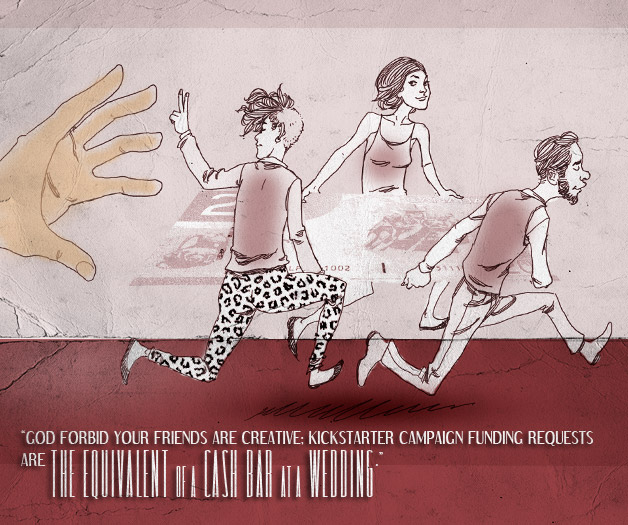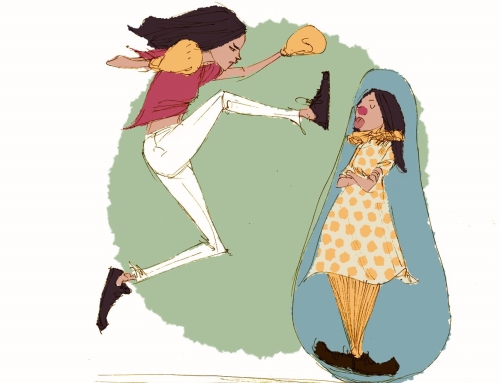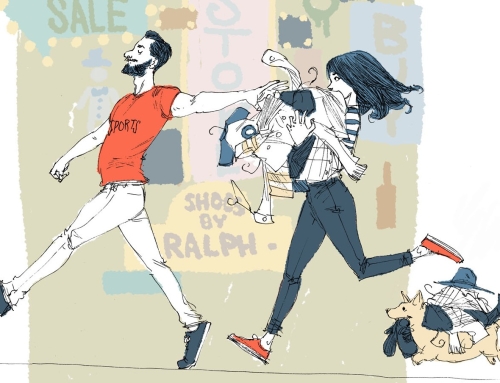There are a lot of ways to go into debt in your twenties. School loans, credit cards, the pervasive influence of consumerism. The number one way however is something that Sesame Street sung to all of us about – friendship. Mo’ besties, mo’ problems pals (not a Sesame Street reference), and if you have not encountered this yet, just wait for the day your Facebook page starts spewing heart shaped status updates. Engaged, married, pregnant – cha-ching, cha-ching, cha-ching.
I am not Carrie Bradshaw. I will not lecture about my inimitable right to purchase $800 shoes. However, I will say that my joy for my friends and their momentous life changes has a direct proportional relationship to the lowering level of my disposable income. There is a recession (still), our undergrad degrees mean very little (still) and somehow the housing market remains untouchable to those without trust funds or indulgent grandparents. It’s a cold, hard world out there, but there is a silver lining, a path to the pot of gold. A supportive extended circle of friends and an engagement ring.
I love my friends. I would happily travel for them, celebrate their life choices, outfit their kitchens if need be. I am not alone. Everyone I know has friendships that have lasted them since high school — people they love they rarely get to see. They also have college friends, who share their memories sleepless nights for both good reasons and bad. Then real life friends — those they’ve met in dive bars and imperfect jobs, and through exes and other friends who have since been long lost. All these people are important in our social well-being, the sense that we have built a community for ourselves in this crazy world. And who can all be counted on to pony up for a rice-cooker, baby-bjorn and $50 donation to a Kickstarter fund for our new alternative short film.

From high school onward, friendship means chipping in. You share the cost of popcorn at the movies, or beers for parties, or go dutch on dinners at nice restaurants without ever batting an eye. People say that friendship and money don’t mix, but having a social life is costly and that is ok, as long as you are getting out of it as much as you put in. Meaning, that all those costs are directly contributing to building your friendship by creating memories together. Loaning money to friends is generally advised against, and birthday presents can be reasonable in relation to your expendable income or lack thereof without ruffling feathers.
The death knell to friendship’s reasonable relationship with money? Wedding bells. It’s a common phenomenon to see a friend who has never cooked a day in her life with a registry full of top of the line kitchen appliances and accessories. Why wouldn’t she need a $200 mixing bowl set? Beyond the wedding day itself there are showers (often several), expensive activities for stags/stagettes, travel to and from the destination, and on and on. Honestly, I don’t mind much — I love seeing my friends happy and if gifts and parties and expensive dresses are part of that, so be it. The problem comes when, like plenty of people I know in their late twenties or early thirties, you have four weddings to go to in a summer. Or a series of engaged friends having showers and weddings and pregnant friends whose thoughtful relatives are throwing them baby showers. Thought you’d put some money in your meager savings account (a piggybank with the words “house fund” written on the side)? No can-do dollface, your spending money is now dedicated to the friend tax.
While I am lucky to have friends whose weddings and babies and general life choices have not been full on money grab bonanzas, observational evidence suggests that this phenomenon is out of control. Some people I know have described stag and stagette parties where you are expected to spend more money on top of the cost of booze and entry on raffle tickets that raise money to help pay for the wedding or honeymoon. Others have told of parties one-step beyond the engagement party/shower/stag circuit, “new home parties” at which friends are invited for a bbq or dinner, and expected to bring an envelope of cash to help the couple in question buy their first home. And god forbid your friends are creative — Kickstarter campaign funding requests are the equivalent to a cash bar at a wedding — you have to pony up for a gift and pay for drinks. Ouch.
What’s the easy fix? The way out of this friendship pyramid scheme? In brief, there isn’t really one. You can’t change city hall — weddings cost lots for the couples, babies are expensive, and no one but those who really love you would ever fund an experimental short film. One friend, whose opinion I sought after noticing the direct proportional relationship between my event-filled social life and money-empty wallet, made a semi-serious suggestion that the only way out is to move far away. That isn’t the advice I will give (although I suppose it could work). My suggestion is the same one I would give about de-cluttering your closet — edit.
You don’t have to be at absolutely everything. The third baby shower for a friend you used to work with? Skip. The destination wedding of a high school friend who you rarely speak to anymore? Skip. It seems brutal, but it is the only way to rein it all in. It feels great to be part of people’s special occasions, but if you think about it, the only people they will remember being there are their families and closest friends. If you fall under that umbrella, by all means you should make an effort to be there, with a nice gift and bells on. If however there is any possibility that they will strain to remember your name when their children point you out in the wedding photos twenty years from now, don’t go. At the least, don’t bow to the pressure to buy some ridiculous bread-maker off the registry. Get them something within your price range that is thoughtful, and spend some time composing your message for the card so it’s clear you care. Finally, my number one piece of advice is as follows: when you get married yourself, put on the invite that gifts aren’t required and really mean it. A whole generation’s bank accounts will thank you.











